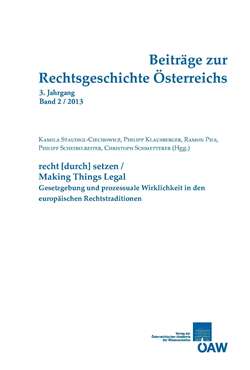
Beiträge zur Rechtsgeschichte Österreichs 2 / 2013, pp. 611-618, 2014/01/30
recht [durch] setzen - Making Things Legal.
Gesetzgebung und prozessuale Wirklichkeit in den europäischen Rechtstraditionen

The Turku Court of Appeal, founded in 1623, was the second Swedish court of appeal. This article examines the educational and career backgrounds of the court’s judges from 1623 to 1753. The research shows that the educational level of the judges rose quickly and many had also studied at foreign universities, but it was not until the eightteenth century that they were almost exclusively educated in Sweden. At the same time career paths within the Court of Appeal started to emerge, whereas in the (early) seventeenth century career paths had been more varied and had included different positions with the Crown’s administration. A comparison with the first Swedish court of appeal, Svea, shows some differences between the two courts in the seventeenth century, but similar trends in the eighteenth century. Finally, the article shows that the networks and contacts of the judges also played an important part in their career paths.